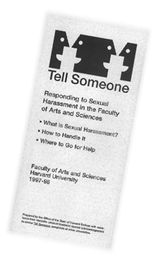![]()
Main Menu ·
Search ·
Current Issue · Contact · Archives · Centennial · Letters to the Editor · FAQs
![]()
Main Menu ·
Search ·
Current Issue · Contact · Archives · Centennial · Letters to the Editor · FAQs
 Women's advocate Larissa Jester '99 and peer counselor Peter Wilson '99. Photograph by Flint Born
Women's advocate Larissa Jester '99 and peer counselor Peter Wilson '99. Photograph by Flint Born |
How does Harvard College address the possibility of inappropriate personal attention, unsolicited advances, or outright propositions in an educational setting?
At least in theory, the College acknowledges that an instructor may abuse a position of power. The Faculty of Arts and Sciences has an official statement on sexual harassment and unprofessional conduct, and publishes its guidelines in pamphlet form and in the Handbook for Students. FAS policy "seeks to maintain a learning and work environment free from sexual harassment, including unprofessional conduct in faculty-student relationships and sexism in the classroom. These kinds of behavior are barriers to the educational, scholarly, and research purposes of the University." Sexual harassment is defined as "inappropriate personal attention by an instructor or other officer who is in a position to exercise professional power over another individual." But the vagueness of the terms "unprofessional conduct" and "sexism" illustrates how difficult it is to define the offense. Even after I had read FAS's policy, the meaning of "sexual harassment" for Harvard students remained an abstraction for me.
But last fall, a close friend, whom I will call Julie, confided to me an experience that revealed the reality of sexual harassment at Harvard. She described an unnerving incident where a faculty member had propositioned her during a one-on-one academic meeting. After speaking with friends, family, and administrators, Julie decided to file a formal complaint against the offending instructor. Even though he did not dispute her presentation of the incident, the teacher received nothing more than a warning and a strong suggestion to seek counseling. The administration assured Julie that the instructor would have no further involvement in her academic life at Harvard, but she still felt dissatisfied with that response. Harvard had not explicitly condemned sexual harassment and inappropriate conduct through real action, but had privately admonished a guilty faculty member.
Although the outcome of this case proved unsatisfactory to the victim, the starkness of the original incident made the procedure less arduous than it might have been had the facts been in dispute. In many cases, both student and instructor may be unsure of the boundaries between an informal learning situation and a potentially harmful relationship.
The ambiguity of definitions and ignorance about procedure may be linked to the campus's general silence on sexual harassment (see "Handling Harrassment, page 73). Larissa Jester '99, who worked for the 1997 Undergraduate Council as a contact for women's issues, believes that the College needs to raise student awareness about sexual harassment in the classroom. "There has been a recent trend to focus more on physical safety issues than on harassment, which is not necessarily how it should be," says Jester, a joint environmental science/public policy and economics concentrator. "We can attack safety problems with concrete measures: providing police whistles for first-years, or handing out wallet cards with emergency phone numbers. Because harassment doesn't involve an immediate life-or-death concern, people tend not to talk openly about it--they may not even know how to talk about it--and the problem becomes more difficult to remedy."

 Karen Avery, hearing officer for complaints. JON CHASE
Karen Avery, hearing officer for complaints. JON CHASE |
Julie's experience might have fallen into this trap of silence. "At first," she remembers, "I wasn't going to come forward about what had happened. Somehow, I had temporarily convinced myself that I was wrong, or that my friends would not believe me or would not understand. But when I realized that people supported me and thought that I had been treated inappropriately, I wanted people to know what had happened. I wanted him to know that he had messed with the wrong girl."
But did Julie's brave decision to come forward make her the exception, and not the rule, in incidents of sexual harassment involving undergraduates and instructors? Students who believe they have been harassed are tormented about what to do. Several campus peer counseling groups report hot-line calls and drop-in visits from students troubled about sexual harassment. One staff member at Response, which addresses sexual relationships, harassment, rape, and battery, says anonymous peer counseling provides a safe environment where students can voice their fears and anxiety. "Because of the ambiguity surrounding sexual harassment, we may receive calls from people who simply need to talk through what they're feeling," she observes. "Even if they have spoken to campus authorities or have filed a formal complaint, students may still feel trapped by the aftermath of the incident. They often don't know what their options are, and they are reluctant to talk to anyone about it, for fear that their grades or reputations depend upon their silence." A counselor at Room 13, an all-night drop-in center, agrees. "Students especially worry that no one will believe their story, that they are powerless to stop the situation, and that they will face serious repercussions if they report an incident."
Torn between emotional health and academic pressure, students, it seems, rarely speak up about sexual harassment, even if they finally conclude it has happened. If a student decides to proceed with a complaint, he or she must continually revisit the feelings engendered by the incident. Elizabeth Doherty, assistant dean of FAS for academic planning, who is one of the hearing officers for sexual harassment cases, emphasizes that "students are often unsure about the course of action they want to pursue; the investigative officers work closely with individual students to ensure that no action is taken without the student's explicit consent."
Karen Avery '87, Ed.M. '90, assistant dean of Harvard College, serves as a hearing officer for undergraduate complaints and coordinates training for the adjunct advisers for sexual harassment in the Houses and the Yard. She also spends time talking informally with students about their worry and discomfort. "I allow students the space to work through a particular incident, to discover if sexual harassment occurred," she says. "If harassment is happening, a student needs to know that this conduct is entirely inappropriate. A student needs to feel good at Harvard in order to learn. When an instructor's behavior prevents a student from feeling comfortable and happy, there is something that the student can do about it."
The range of actions a student may pursue varies--from talking directly with the instructor involved, to seeking advice from a tutor or hearing officer, to filing a formal complaint. "Informal mediation" is the most frequent form of resolution for incidents involving undergraduates and faculty members. Doherty says she may speak to the offending teaching fellow or faculty member directly, have a TF removed from a course, or have a student transferred from an unprofessional advising relationship.
Because Julie did not feel that informal mediation would address the serious nature of her situation, she registered a formal complaint. The process begins with fact-finding: both student and faculty member write detailed accounts of the incident. Witnesses or other evidence may be brought in to resolve discrepancies and facilitate a judgment about responsibility. Then FAS dean Jeremy R. Knowles makes the final decisions about culpability, the suitability of disciplinary action, and the nature of that action.
Julie was disappointed by the College's "non-decision" in her case. She felt that a private warning could not operate either as an effective deterrent, or as an educational tool for the undergraduate population. "I wanted the incident to be made public, so that other faculty members would be scared," she maintains. "The only way sexual harassment will stop is to make people aware of the problem."
Karen Avery agrees that awareness at the College is low. "I have the sense that people on campus do not necessarily believe there is a problem with sexual harassment, which may also be the case among the general public," she notes. "But power relationships exist at Harvard as they do anywhere else. While one might assume that authority figures know how to behave professionally with undergraduates, some people have trouble establishing clear boundaries in the classroom."
The need to define boundaries is not limited to the classic case of a male faculty member preying upon a coed. Male undergraduates are subject to similar concerns about academic power and its abuse. Undergraduate teaching fellows may pose a special dilemma, for the line between the teaching relationship and the peer relationship is extremely fine, intensifying the complexity of sexual harassment in the college setting. The range of cases illustrates the need for a dialogue that would help both students and faculty members define appropriate behavior. That's why Julie favors publicizing cases like hers. "Every single time I tell someone about what happened to me, I hear more stories about sexual harassment in the classroom, but few people know about them," Julie says. "Sexual harassment is not something that you can see directly in front of you--when it happens, Harvard needs to point it out, and come down publicly against it."
Of course, both faculty members and students could face grave consequences from allegations of harassment, so there is a natural reluctance to publicize cases. But this leaves the College community relatively blind to sexual harassment, unless one hears about a particular case. Incidents obviously occur, so in its efforts to protect reputations, the College stumbles into another trap of silence.
Peter Wilson '99, a biochemistry concentrator who is active in peer counseling on campus, remembers one incident of student-to-student harassment that he believes called into question the value of attaching names to incidents. "It is important to know that sexual harassment has happened, and possibly to know the consequences," he says. "However, I'm strongly against releasing names; there can be a huge stigma attached to these incidents, especially for the victim. People are much quicker to dismiss a victim's claims than they are to consider the accused guilty. Either way, it's difficult to be anonymous and still divulge the consequences of sexual harassment."
Within the pervasive silence, the College has made efforts to raise undergraduate awareness of sexual harassment. A new safety-orientation program informed first-years and incoming students of the FAS guidelines on unprofessional conduct. And last October, all upperclass students found in their mailboxes a copy of the pamphlet Tell Someone: Responding to Sexual Harassment in the Faculty of Arts and Sciences (previously sent only to House offices, for interested students to pick up). Karen Avery had been startled to discover how few peer counselors, let alone other undergraduates, had seen the brochure; with the help of the Radcliffe Union of Students, she initiated the mass mailing to educate students. (Freshmen received Tell Someone in their registration packets.)
But as I talked to undergraduates, administrators, peer counselors, and friends, I still perceived little familiarity with the problem. After struggling with Julie to comprehend how sexual harassment invaded her classroom, I wanted every Harvard student to witness her distress, her anger, and her persistent fear.
Even Julie agreed. "My fantasy is that everyone would know what happened, but that they would also know that it was not my fault. I had hoped that the ordeal might give me some relief from feeling like a victim. But the secrecy of the procedure has only exacerbated the guilt, as well as the underlying fear that somehow the faculty member will find a way to punish me for coming forward. Eventually, the process had to hit a wall--the same power relationship that allowed him to sexually harass me also protected him from exposure and allowed him to walk away. No real good came out of my coming forward--and that is what other students will learn from my experience."
Main Menu ·
Search · Current Issue · Contact · Archives · Centennial · Letters to the Editor · FAQs
![]()